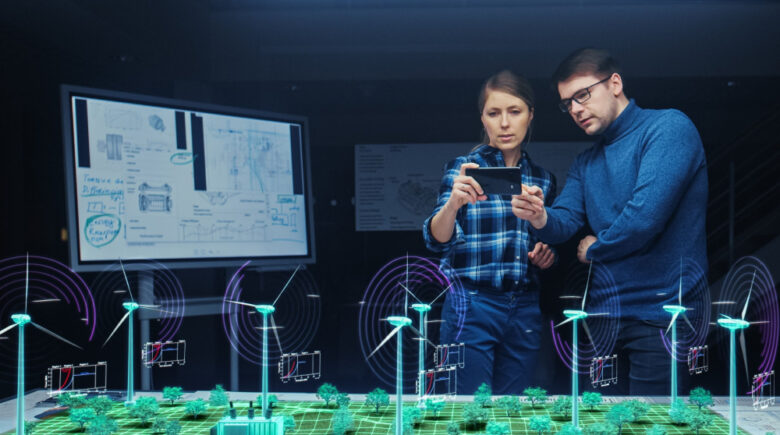In an era where the delicate balance of our planet’s ecosystems teeters on the brink, the clarion call for a sustainable energy revolution has never been more resounding. As the ominous shadows of climate change loom large and fossil fuel reserves dwindle, humanity finds itself at a crossroads. In this pivotal moment, the resplendent promise of renewable energy emerges as a beacon of hope, offering a transformative solution to our pressing environmental and energy challenges. With the inexorable march toward a cleaner, greener future, the benefits of harnessing renewable energy sources take center stage in shaping a world that thrives in harmony with nature.
Mitigation of Climate Change
The pivotal advantage of renewable energy lies in its profound contribution to mitigating climate change. Unlike fossil fuels, which release substantial greenhouse gases upon combustion, renewable sources emit minimal to no carbon dioxide or pollutants during energy generation. By reducing the carbon footprint and curbing emissions, renewable energy plays a pivotal role in limiting global temperature rise, minimizing the frequency and intensity of extreme weather events, and preserving delicate ecosystems. This proactive approach aligns with international commitments, such as the Paris Agreement, and charts a course toward a sustainable future where clean energy sources take precedence, safeguarding the planet for current and future generations.
Clean Air and Improved Public Health
Transitioning to renewable energy sources offers a breath of fresh air by markedly improving public health through cleaner atmospheric conditions. Unlike conventional energy generation, which releases harmful pollutants like sulfur dioxide and particulate matter, renewable technologies produce negligible emissions. This reduction in air pollution translates to fewer cases of respiratory illnesses, cardiovascular diseases, and premature deaths, particularly in densely populated urban areas. As communities experience clearer skies and reduced smog levels, the burden on healthcare systems diminishes, leading to lower healthcare costs and enhanced overall well-being. Embracing renewables thus becomes a powerful prescription for a healthier society, as it not only energizes our lives sustainably but also ensures the air we breathe is revitalizing rather than detrimental.
Sustainable and Infinite Supply
Renewable energy’s allure lies in its promise of a sustainable and boundless energy supply. Unlike finite fossil fuel reserves, renewable sources such as sunlight, wind, and water are perpetually available. The sun’s inexhaustible energy harnessed through solar panels and the ceaseless wind captured by turbines assures an uninterrupted power source. Coupled with advancements in energy storage technologies, like batteries, excess energy can be stored for use during cloudy days or calm nights. This seamless cycle of energy regeneration safeguards against depletion, ensuring future generations inherit a reliable and perpetual energy reservoir. Embracing renewables not only satiates today’s energy needs but establishes a harmonious equilibrium between human progress and the Earth’s enduring capacity to sustain it.
Energy Independence
Embracing renewable energy sources is a definitive stride towards energy independence, liberating nations from the shackles of fossil fuel imports. By harnessing local, renewable resources, countries reduce their vulnerability to volatile global energy markets and geopolitical uncertainties. This strategic shift empowers nations to chart their energy destiny, fostering self-sufficiency and stability. Moreover, decentralized renewable systems, such as rooftop solar panels and microgrids, enable communities to generate their own power, further enhancing energy autonomy. This transition not only strengthens national security but also fuels economic growth by redirecting resources spent on energy imports towards local industries, job creation, and innovation. With energy independence as the guiding light, renewable energy propels nations toward a resilient, sovereign, and sustainable future.
Job Creation and Economic Growth
The adoption of renewable energy sources sparks a dynamic cycle of job creation and robust economic growth. As investments flow into renewable technologies, a diverse array of employment opportunities emerges across the entire value chain. Skilled engineers, technicians, researchers, and manufacturing workers find roles in designing, producing, and maintaining renewable systems. Local communities benefit from increased economic activity as renewable projects stimulate demand for construction, transportation, and service industries. Furthermore, the renewable sector’s steady expansion attracts private investment, fosters innovation, and incubates start-ups, propelling technological advancement and economic resilience. By nurturing a green workforce and revitalizing economies, renewable energy cultivates a future where sustainable prosperity flourishes, benefiting both societies and the planet.
Low Operating Costs
Renewable energy systems offer a compelling advantage with their remarkably low operating costs. Once established, solar panels, wind turbines, and hydropower installations entail minimal ongoing expenses compared to conventional fossil fuel power plants. Maintenance requirements are streamlined due to fewer moving parts and reduced exposure to wear and tear. Additionally, the abundance of renewable resources, such as sunlight and wind, incurs negligible fuel costs, unlike fossil fuels subject to price fluctuations. This cost-efficiency not only ensures stable electricity prices for consumers but also frees up resources that can be directed towards further investments in clean energy infrastructure, grid modernization, and other vital sectors, fostering sustainable economic growth and energy stability.
Global Leadership and Sustainable Image
Championing renewable energy thrusts nations into a position of global leadership, exemplifying their commitment to sustainability and environmental stewardship. By adopting and promoting clean energy solutions, countries showcase a forward-thinking approach to addressing pressing global challenges. This stance resonates positively on the international stage, fostering cooperation and partnerships while bolstering diplomatic relations. Additionally, embracing renewables enhances a nation’s reputation as a responsible custodian of natural resources, attracting investment, trade opportunities, and knowledge exchange. Such leadership not only empowers countries to influence the global transition towards sustainable practices but also enables them to set high standards for innovation, policy development, and technological advancement, solidifying their legacy as pioneers in forging a greener and more prosperous world.
As the world stands at a crossroads, the power of renewable energy beckons us towards a future where hope and possibility intertwine. With each solar panel that gleams under the sun’s embrace and every wind turbine that dances with the breeze, we inscribe a narrative of resilience and determination onto the fabric of our planet. The benefits of renewable energy are not merely statistics on paper; they are the breaths of cleaner air filling the lungs of our communities, the sparks of innovation igniting our economies, and the pledges we make to safeguard the home we share. It’s a promise of cleaner horizons for generations yet unborn, an invitation to wield our ingenuity in harmony with nature. By embracing renewable energy, we are not just powering tomorrow but weaving a tapestry of sustainable dreams into reality. Let our choices today illuminate the path towards a brighter, greener, and more vibrant world for all.
In an era where the delicate balance of our planet’s ecosystems teeters on the brink, the clarion call for a sustainable energy revolution has never been more resounding. As the ominous shadows of climate change loom large and fossil fuel reserves dwindle, humanity finds itself at a crossroads. In this pivotal moment, the resplendent promise of renewable energy emerges as a beacon of hope, offering a transformative solution to our pressing environmental and energy challenges. With the inexorable march toward a cleaner, greener future, the benefits of harnessing renewable energy sources take center stage in shaping a world that thrives in harmony with nature.
Mitigation of Climate Change
The pivotal advantage of renewable energy lies in its profound contribution to mitigating climate change. Unlike fossil fuels, which release substantial greenhouse gases upon combustion, renewable sources emit minimal to no carbon dioxide or pollutants during energy generation. By reducing the carbon footprint and curbing emissions, renewable energy plays a pivotal role in limiting global temperature rise, minimizing the frequency and intensity of extreme weather events, and preserving delicate ecosystems. This proactive approach aligns with international commitments, such as the Paris Agreement, and charts a course toward a sustainable future where clean energy sources take precedence, safeguarding the planet for current and future generations.
Clean Air and Improved Public Health
Transitioning to renewable energy sources offers a breath of fresh air by markedly improving public health through cleaner atmospheric conditions. Unlike conventional energy generation, which releases harmful pollutants like sulfur dioxide and particulate matter, renewable technologies produce negligible emissions. This reduction in air pollution translates to fewer cases of respiratory illnesses, cardiovascular diseases, and premature deaths, particularly in densely populated urban areas. As communities experience clearer skies and reduced smog levels, the burden on healthcare systems diminishes, leading to lower healthcare costs and enhanced overall well-being. Embracing renewables thus becomes a powerful prescription for a healthier society, as it not only energizes our lives sustainably but also ensures the air we breathe is revitalizing rather than detrimental.
Sustainable and Infinite Supply
Renewable energy’s allure lies in its promise of a sustainable and boundless energy supply. Unlike finite fossil fuel reserves, renewable sources such as sunlight, wind, and water are perpetually available. The sun’s inexhaustible energy harnessed through solar panels and the ceaseless wind captured by turbines assures an uninterrupted power source. Coupled with advancements in energy storage technologies, like batteries, excess energy can be stored for use during cloudy days or calm nights. This seamless cycle of energy regeneration safeguards against depletion, ensuring future generations inherit a reliable and perpetual energy reservoir. Embracing renewables not only satiates today’s energy needs but establishes a harmonious equilibrium between human progress and the Earth’s enduring capacity to sustain it.
Energy Independence
Embracing renewable energy sources is a definitive stride towards energy independence, liberating nations from the shackles of fossil fuel imports. By harnessing local, renewable resources, countries reduce their vulnerability to volatile global energy markets and geopolitical uncertainties. This strategic shift empowers nations to chart their energy destiny, fostering self-sufficiency and stability. Moreover, decentralized renewable systems, such as rooftop solar panels and microgrids, enable communities to generate their own power, further enhancing energy autonomy. This transition not only strengthens national security but also fuels economic growth by redirecting resources spent on energy imports towards local industries, job creation, and innovation. With energy independence as the guiding light, renewable energy propels nations toward a resilient, sovereign, and sustainable future.
Job Creation and Economic Growth
The adoption of renewable energy sources sparks a dynamic cycle of job creation and robust economic growth. As investments flow into renewable technologies, a diverse array of employment opportunities emerges across the entire value chain. Skilled engineers, technicians, researchers, and manufacturing workers find roles in designing, producing, and maintaining renewable systems. Local communities benefit from increased economic activity as renewable projects stimulate demand for construction, transportation, and service industries. Furthermore, the renewable sector’s steady expansion attracts private investment, fosters innovation, and incubates start-ups, propelling technological advancement and economic resilience. By nurturing a green workforce and revitalizing economies, renewable energy cultivates a future where sustainable prosperity flourishes, benefiting both societies and the planet.
Low Operating Costs
Renewable energy systems offer a compelling advantage with their remarkably low operating costs. Once established, solar panels, wind turbines, and hydropower installations entail minimal ongoing expenses compared to conventional fossil fuel power plants. Maintenance requirements are streamlined due to fewer moving parts and reduced exposure to wear and tear. Additionally, the abundance of renewable resources, such as sunlight and wind, incurs negligible fuel costs, unlike fossil fuels subject to price fluctuations. This cost-efficiency not only ensures stable electricity prices for consumers but also frees up resources that can be directed towards further investments in clean energy infrastructure, grid modernization, and other vital sectors, fostering sustainable economic growth and energy stability.
Global Leadership and Sustainable Image
Championing renewable energy thrusts nations into a position of global leadership, exemplifying their commitment to sustainability and environmental stewardship. By adopting and promoting clean energy solutions, countries showcase a forward-thinking approach to addressing pressing global challenges. This stance resonates positively on the international stage, fostering cooperation and partnerships while bolstering diplomatic relations. Additionally, embracing renewables enhances a nation’s reputation as a responsible custodian of natural resources, attracting investment, trade opportunities, and knowledge exchange. Such leadership not only empowers countries to influence the global transition towards sustainable practices but also enables them to set high standards for innovation, policy development, and technological advancement, solidifying their legacy as pioneers in forging a greener and more prosperous world.
As the world stands at a crossroads, the power of renewable energy beckons us towards a future where hope and possibility intertwine. With each solar panel that gleams under the sun’s embrace and every wind turbine that dances with the breeze, we inscribe a narrative of resilience and determination onto the fabric of our planet. The benefits of renewable energy are not merely statistics on paper; they are the breaths of cleaner air filling the lungs of our communities, the sparks of innovation igniting our economies, and the pledges we make to safeguard the home we share. It’s a promise of cleaner horizons for generations yet unborn, an invitation to wield our ingenuity in harmony with nature. By embracing renewable energy, we are not just powering tomorrow but weaving a tapestry of sustainable dreams into reality. Let our choices today illuminate the path towards a brighter, greener, and more vibrant world for all.



